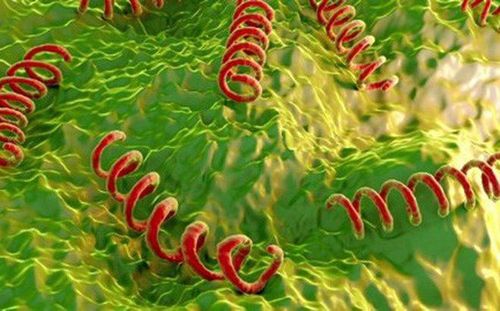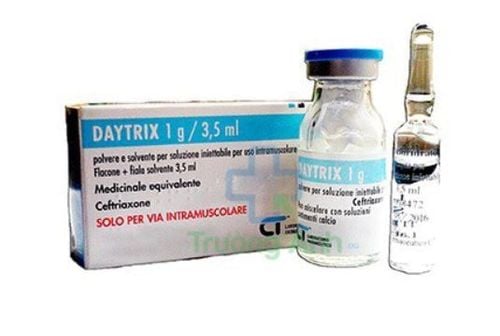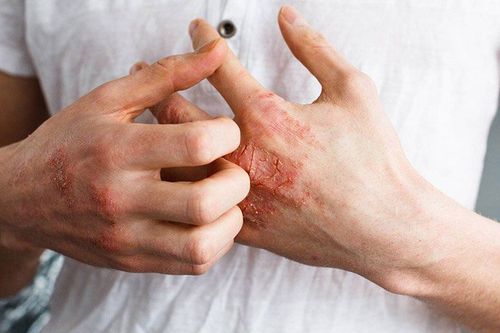This is an automatically translated article.
Syphilis is a fairly common sexually transmitted disease today. If you don't take proactive measures to prevent it, you will easily become the target of this social disease.
1. What causes syphilis?
Syphilis is a sexually transmitted disease caused by the bacterium Treponema pallidum. This is a very common disease with a high incidence. According to statistics in 2016, there were more than 88,000 cases of syphilis detected in the United States (according to the data of the Centers for Disease Control and Prevention).
In Vietnam today, the rate of syphilis is also increasing. In Ho Chi Minh City, the Dermatology Hospital has recorded 11,028 cases of syphilis in adults in the years 2010-2016. According to the Pasteur Institute of Ho Chi Minh City, the rate of syphilis accounts for about 2% - 3% of the total. 200,000 cases of sexually transmitted infections in Vietnam.
The bacteria Treponema Pallidum that causes syphilis can infect the body through many ways, and each of these pathways will be the cause of the disease.
The most common route of syphilis transmission in men and women is through contact between an infected person and a healthy person through unprotected sex. Besides, Treponema Pallidum can also infect the body through small cuts, scratches, mucous membranes...
A person who has had syphilis in the past can be completely cured, without recurrence. sick. However, the disease can still occur if you still have contact with someone who has syphilis in the above way, the risk of syphilis infection in both women and men will be very high.

Vi khuẩn Treponema Pallidum
The following people are at high risk for syphilis (prone to syphilis):
Unprotected sex, promiscuous sex with many partners. Same-sex sexual relations. People infected with HIV virus. In addition, syphilis can also be transmitted by direct kissing or syphilis is transmitted from mother to child. However, this is rarely the case.
2. Is syphilis dangerous?
With a high incidence, syphilis is threatening a lot of people in today's society. Although it can be treated completely, but if not prevented, the attack of syphilis bacteria can cause many consequences for the body through each stage.
Primary Stage The genital area (vaginal or penis) will begin to develop sores. Sometimes, these sores will also form in the mouth. Time from 10 days to 3 months after infection. These sores are usually round, small, and hard, and painless. After a certain period of time, the sores will disappear on their own. However, the bacteria will still remain in the body if no treatment is given.
Secondary Stage The patient may have a rash with a rough, red or brownish mottled rash. These rashes appear on the palms and soles, and are not itchy. In addition, some other parts of the body may also appear erythema along with other symptoms such as fever, hair loss, swollen lymph nodes.
Latent stage This is a very difficult stage to detect because the patient will no longer show any symptoms. However, the infection still gradually develops in the body. The latent stage of syphilis lasts a long time, even up to 30 years, before turning into a final stage. At this stage, it is very easy to spread syphilis to others.
Late stage When the disease has progressed to this final stage, the syphilis bacteria have enough ability to attack all parts of the body, including vital organs such as the brain, heart, bones, liver, eyes. , joints - nerves and blood vessels. Brain damage, blindness... will happen. This is also when the disease is very difficult to control.
It can be seen that, with silent and prolonged development, the patient's subjectivity is an extremely useful tool for bacteria to take advantage of, grow and cause serious harm. Therefore, like many other diseases, prevention is essential.
3. Summary of measures to prevent syphilis
The best way to prevent syphilis is to prevent the attack of syphilis bacteria during sexual activity. Some of the following methods will help you reduce the risk of syphilis during sex:
Always use condoms with lubricant. When having oral sex, use specialized dental dams. Should limit the number of sexual partners or should only have sex with the lover/spouse. Regular health check

Sử dụng bao cao su khi quan hệ tình dục giúp phòng tránh bệnh giang mai
Syphilis can happen to anyone, especially those who have had sex. So, when you notice sores on your genitals or any other site of sexual contact, go to the hospital or clinic to have diagnostic tests for syphilis.
Currently, syphilis can be diagnosed through blood tests, testing of fluid from swollen lymph nodes (in primary or secondary syphilis).
Vinmec International General Hospital offers a Package of Examination and Screening for social diseases to help customers detect diseases early and have effective treatment and prevent dangerous complications. The screening package for social diseases at Vinmec is for all ages, both men and women.
Please dial HOTLINE for more information or register for an appointment HERE. Download MyVinmec app to make appointments faster and to manage your bookings easily.













